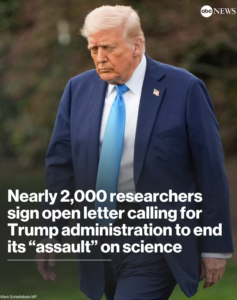In early 2025, the scientific community in the United States faced significant challenges due to actions taken by the Trump administration that were perceived as direct assaults on scientific integrity and independence. Over 1,900 scientists from the National Academies of Sciences, Engineering, and Medicine signed an open letter expressing deep concern over these developments. They highlighted issues such as threats to private universities, cancellation of federal grants, ideological funding reviews, mass layoffs, resignations, and censorship. The letter warned that these actions were decimating America’s scientific enterprise and called for the protection of independent scientific inquiry. The Guardian
The administration’s approach included scrutinizing research grants, particularly those containing terms related to diversity, equity, and inclusion (DEI). This led to fears that entire academic fields, especially in social sciences, could suffer due to political interference in funding decisions. Neal Lane, former director of the National Science Foundation (NSF), described these actions as unprecedented, emphasizing that the NSF has a mandate to ensure all Americans have opportunities to participate in science. KMXT+2KMUW+2WHRO Public Media+2NHPR
In response to these challenges, the “Stand Up for Science 2025” rallies were organized across the United States and internationally. On March 7, 2025, approximately 2,000 individuals gathered at the Lincoln Memorial in Washington, D.C., with parallel demonstrations in over 30 U.S. cities and solidarity events in countries including France. These rallies aimed to oppose freezes on scientific grants, dismissal of government scientists, advocate for expanded funding for scientific research, and call for the reinstatement of DEI initiatives within government-funded science. KMXT+3Wikipedia+3AP News+3
The administration’s actions also included directives that halted federal funds for programs across the country, causing chaos and uncertainty within the scientific community. Public health researchers, particularly those studying gun violence, expressed concern that these measures represented a direct attack on science. Dr. Garen Wintemute of UC Davis highlighted the potential disappearance of federal funding for critical research areas. The Trace
Climate scientists were notably apprehensive about potential threats to their work. The administration’s previous term saw federal websites being scrubbed of climate information and significant proposed budget reductions. Scientists feared that the new administration could dismantle agencies like the National Oceanic and Atmospheric Administration (NOAA) and the Environmental Protection Agency (EPA), drastically reorganize departments, and reduce staff. NHPR+5Politico+5Wikipedia+5
The scientific community’s concerns extended to the broader implications of these actions on America’s competitive edge in global research and innovation. Diana Macias, an ecologist at the University of California, Berkeley, warned that such scrutiny could make research less collaborative, competitive, and innovative. The potential reduction in funding and support for science posed risks to the development of a skilled workforce necessary for addressing critical issues in artificial intelligence, cybersecurity, and more. WUSF+2wbaa.org+2NHPR+2
In summary, the early months of 2025 were marked by significant tension between the Trump administration and the scientific community. The administration’s actions, perceived as undermining scientific integrity and independence, prompted widespread concern and mobilization among scientists and supporters. The situation underscored the critical importance of safeguarding scientific research from political interference to ensure continued progress and innovation.
